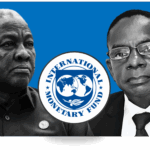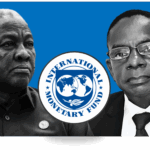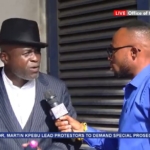
Asset-declaration systems are globally recognized as powerful tools for promoting integrity in public office, deterring illicit enrichment, and strengthening public trust. Ghana’s Constitution embraces this principle by requiring public officers to declare their assets at the beginning and end of their tenure and at intervals while in office. Yet despite a seemingly strong legal foundation, the International Monetary Fund (IMF) says the system is failing. In its latest Governance Diagnostic Assessment of Ghana, the Fund concludes that Ghana’s asset-declaration regime is “incomplete and ineffective” as an anti-corruption mechanism.
Ghana’s framework is built on Article 286 of the 1992 Constitution and the Public Office Holders (Declaration of Assets and Disqualification) Act, 1998 (Act 550). Together, they set out who must declare, what must be declared, and when. The list of officials required to file is broad, covering the President and Vice President, Ministers, Members of Parliament, judges, heads of public institutions, constitutional office holders, and senior public servants.
In theory, this architecture should help Ghana prevent corruption by requiring transparency at the beginning and end of a public officer’s tenure, making illicit wealth accumulation easier to detect. The law sets out a comprehensive range of assets and liabilities that must be declared: land, buildings, farms, vehicles, business interests, bank balances, securities, jewellery above specified values, and family property in which the officer has a beneficial interest.
It also stipulates that any property acquired by a public officer that cannot be justified through legitimate income sources may be deemed “unlawfully acquired.” Declarations may be used as evidence in judicial or investigative processes, and violations can lead to sanctions, including disqualification from holding public office.
However, the IMF notes that the strength of the legal provisions has not translated into real accountability. One of the most significant weaknesses is the narrow scope of the declarations. Ghana does not require public officials to declare assets held in the names of spouses, children, or close family members. The IMF notes that this omission creates a significant loophole, allowing officials to conceal assets through relatives and effectively undermine the purpose of the regime.
Read Also: OSP has no clear and consistent systems to decide when cases are ready for court—IMF Report
The Fund also highlights the unusually long four-year interval between declarations. Although officials must file upon assuming and leaving office, the intervening four-year period is described by the fund as “exceptionally long” in a country with high corruption vulnerabilities. Long gaps between filings make it almost impossible to detect sudden or suspicious wealth accumulation, one of the clearest red flags of corrupt conduct. In many countries with stronger systems, declarations are updated annually to allow for credible monitoring.
Verification remains another major structural flaw, according to the Fund. Declarations are submitted to the Auditor-General, while the Commission on Human Rights and Administrative Justice (CHRAJ) is responsible for verifying compliance and imposing sanctions. The IMF notes that this split mandate has created an accountability vacuum, with CHRAJ lacking the resources, capacity, and legal authority to access bank records, land registry data, or tax files needed to verify declarations. As a result, declarations are rarely checked, and most are simply accepted at face value. In practical terms, the IMF argues, this reduces the entire system to one that relies on trust rather than scrutiny.
The regime is further undermined by its extreme confidentiality. Asset declarations are kept in sealed envelopes and are not accessible to the public, civil society, or even other oversight institutions. This level of secrecy eliminates one of the strongest deterrents to corruption, public scrutiny. Global evidence shows that accessible or partially disclosed declarations significantly increase compliance and honesty. Yet Ghana’s system remains opaque, insulating public officials from any form of external accountability.
The IMF also criticizes the absence of digital infrastructure. Unlike many governance systems that have undergone digital transformation, Ghana’s asset-declaration process remains entirely paper-based. There is no electronic filing system, no digital registry, and no mechanism for tracking compliance. The Auditor-General has no tools to analyze data or cross-check information, and the government does not publish statistics on compliance rates. As a result, it is impossible for the public to know how many officials have filed, who has defaulted, or whether sanctions have ever been applied.
These weaknesses echo longstanding complaints from civil society organizations and former Auditor-Generals, who have described the declarations as nothing more than “sealed envelopes gathering dust.” Successive governments have promised reforms, including digitization, shorter filing intervals, and improved transparency, but progress has been slow. The Conduct of Public Officers Bill, intended to modernize Ghana’s ethics and conflict-of-interest laws, remains stalled years after it was first introduced.
The IMF’s assessment makes clear that while Ghana’s asset-declaration regime is vital for fighting corruption, it currently functions more as a formality than as a safeguard. Strong laws have been undermined by weak implementation, limited verification, lack of transparency, and poor institutional coordination. According to the Fund, meaningful reform will require expanding the scope of declarations to cover beneficial ownership, shortening filing cycles, introducing a modern digital system, empowering verification authorities, enforcing sanctions consistently, and allowing some degree of public disclosure.
Ultimately, the IMF warns that Ghana’s anti-corruption efforts will remain hamstrung until asset declarations move from sealed envelopes to genuine transparency and oversight. Without practical reform, the system will continue to fall far short of the Constitution’s vision of integrity in public office.
- President Commissions 36.5 Million Dollars Hospital In The Tain District
- You Will Not Go Free For Killing An Hard Working MP – Akufo-Addo To MP’s Killer
- I Will Lead You To Victory – Ato Forson Assures NDC Supporters
Visit Our Social Media for More




